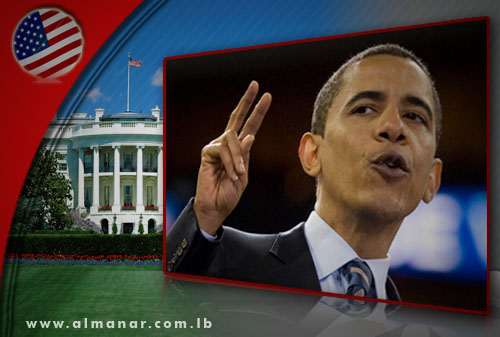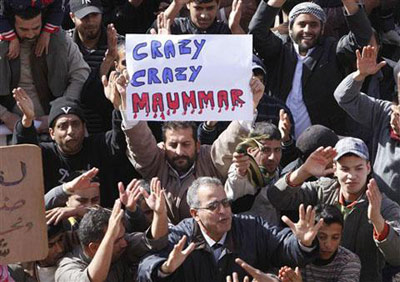"I can report that we have stopped Gaddafi’s deadly advance"
 In a televised address to the American nation aimed at allaying their fear over US’s intervention in Libya action, US president Barack Obama defended on Monday night America's involvement in the military campaign against Muammar Gaddafi's regime.
In a televised address to the American nation aimed at allaying their fear over US’s intervention in Libya action, US president Barack Obama defended on Monday night America's involvement in the military campaign against Muammar Gaddafi's regime.
Speaking to military officers and reporters at the National Defense University in Washington, Obama was ‘emotional’ to say that he refused to wait for images of the slaughter of civilians before taking action.
America is preoccupied with domestic economic concerns and weary of costly wars in two other Muslim countries, Iraq and Afghanistan where civilians are being killed daily instead of living in peace.
In blunt terms, Obama said the Western-led air campaign had stopped Gaddafi's advances and halted a slaughter that could have shaken the stability of an entire region and "stained the conscience of the entire world".
"To brush aside America's responsibility as a leader and more profoundly our responsibilities to our fellow human beings under such circumstances would have been a betrayal of who we are." "I can report that we have stopped Gaddafi's deadly advance," the US president said.
"We will deny the regime arms, cut off its supply of cash, assist the opposition, and work with other nations to hasten the day when Gaddafi leaves power," he said. But he added that "it [Gaddafi's departure] may not happen overnight".
However, he said that broadening the international mission to include regime change would be a mistake. "If we tried to overthrow Gaddafi by force, our coalition would splinter," he said.
Obama's speech was on the eve of a 35-nation conference in London to tackle the crisis in the crisis-hit country and weigh political options for ending Gaddafi's 41-year rule.
The US took the initial lead in the Western-led military action against Gaddafi, before NATO agreed to take over the operations. Obama said the US will transfer control to NATO on Wednesday.
Libya's raging battles: cat and mouse chase
Western coalition air strikes hit civilian and military areas in the Libyan towns of Garyan and Mizdah, both within 200 kilometers from the capital of Tripoli.
U.S. Admiral Bill Gortney said that the coalition forces had attacked the command headquarters of one of Gaddafi's most loyal units. Gortney, the director of the U.S. military's Joint Staff, told reporters the coalition had fired six Tomahawk cruise missiles in the past 24 hours and had carried out 178 air sorties.
He denied that the western forces had caused any civilian casualty.
Meanwhile, forces loyal to Gaddafi on Tuesday pushed back revolutionists in east Libya, pinning them down in Nofilia 100 kilometers from Sirte.
The revolutionists were on Monday pummeled by loyalist forces at the village of Harawa, 60 kilometers from Sirte.
Fighting between revolutionists and forces loyal to leader Muammer Gaddafi continued in Libya's third largest city, Misrata, on Monday despite a government declaration of cease-fire against what it called "terrorist groups" in the area.
A government spokesman said that Gaddafi forces had seized part of Misrata, while part of the city while the rest was under revolutionists control.
Western campaign similar to Hitler's ones
In a letter addressed to international powers meeting in London Tuesday to discuss his nation's future Gaddafi, called for an end to the "barbaric offensive" against Libya. He likened the NATO-led air strikes to military campaigns launched by Adolf Hitler during World War II.
 "Leave Libya for the Libyans. You are committing genocide against a peaceful people and a developing nation," he said. "It seems that you in Europe and America don't realize the hellish, barbaric (military) offensive which compares... to Hitler's campaigns when he invaded Europe and bombed Britain," he added. Also addressing the London meeting, Gaddafi said in his message: "How could you attack those who are fighting against Al-Qaeda."
"Leave Libya for the Libyans. You are committing genocide against a peaceful people and a developing nation," he said. "It seems that you in Europe and America don't realize the hellish, barbaric (military) offensive which compares... to Hitler's campaigns when he invaded Europe and bombed Britain," he added. Also addressing the London meeting, Gaddafi said in his message: "How could you attack those who are fighting against Al-Qaeda."
Gaddafi in his letter said he will "accept any decision taken by the African Union." A Libyan delegation to African Union talks Friday in Addis Ababa said Tripoli is ready to implement an AU roadmap to resolve the Libyan crisis, while also demanding a halt to the Western strikes on the country.
The Addis Ababa talks were attended by EU, UN and Arab League representatives, following an invitation from AU Commission chairman Jean Ping.
